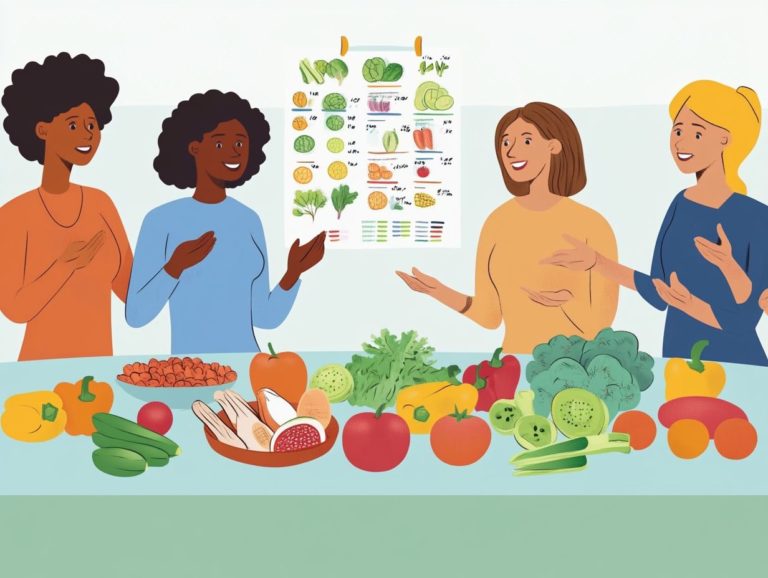What Are the Benefits of Eating Local?
Eating local transcends mere trendiness; it s a deliberate choice that enriches our planet, enhances your health, and strengthens your community.
This exploration delves into the many benefits of sourcing food from nearby. By doing so, you reduce your carbon footprint, preserve biodiversity, and elevate the nutritional value of your meals while minimizing exposure to harmful chemicals. The benefits are truly substantial.
Supporting local farmers and businesses breathes new life into the economy. Uncover practical tips for weaving local foods into your diet, allowing you to make a meaningful and positive impact.
Contents
Key Takeaways:
Support local farmers and boost your local economy while enjoying fresher, healthier meals!
Eating local can help reduce your carbon footprint and support the preservation of biodiversity. Consuming fresh, local foods can provide higher nutritional value and reduce exposure to harmful pesticides and chemicals.
Defining Eating Local
Eating local means sourcing your food from nearby farms, markets, and producers. This practice supports the local economy, nurtures community connections, and promotes sustainable practices.
By embracing this philosophy, you prioritize seasonal and nutrient-rich foods that are often fresher and healthier than mass-produced alternatives.
When you choose to eat local, you indulge in unique flavors, preserve food history, and engage in practices that enhance food security and sustainability.
This approach boosts your personal well-being and strengthens community bonds.
Local food systems play a vital role in fortifying community ties and fostering a genuine sense of belonging. Farmers markets become vibrant gathering spots where you can connect directly with growers.
They offer insights into your food sources and the significance of sustainable farming practices.
Community-supported agriculture (CSA) programs allow you to buy a share of a local farm’s produce, ensuring you get fresh fruits and vegetables directly from the source.
Embracing local food improves your health by steering clear of processed options while also reducing the carbon footprint linked to transportation.
This practice champions local businesses, fueling job creation and investment within your community.
The importance of eating local reaches far beyond individual choices. It creates ripples through ecosystems, economies, and social structures, fostering a richer, more connected community.
Environmental Benefits of Eating Local
Eating local foods greatly enhances your commitment to environmental sustainability. When you choose to source meals from nearby growers, you substantially reduce transport emissions and minimize food waste.
You also foster biodiversity by supporting the cultivation of heirloom and diverse local crops. This thoughtful approach lowers the carbon footprint linked to long-distance transportation.
It encourages farming practices that prioritize sustainability and actively work to reduce pollution. Embracing local produce is not just a culinary choice; it s a powerful step toward a healthier planet.
Reducing Carbon Footprint
One of the most significant environmental benefits of eating local is the substantial reduction in your carbon footprint. By opting for locally sourced foods instead of those transported over long distances, you effectively cut down on high transport emissions.
Choosing locally grown produce naturally minimizes the need for extensive packaging and refrigeration that typically accompany long-haul transport.
Local food reaches your plate fresher and requires fewer resources to maintain its quality, which further lowers emissions tied to energy consumption.
Sustainable practices in local agriculture like organic farming and regenerative techniques enhance soil health and biodiversity, ultimately contributing to a lower overall carbon output.
When communities prioritize local food systems, they foster a cycle of sustainability that benefits both the environment and local economies.
By choosing local, you re not just eating better; you re helping to create a vibrant, sustainable future for your community!
Preserving Biodiversity
Eating local transforms your health and the environment! It is essential in preserving biodiversity by encouraging the cultivation and consumption of heirloom crops and unique local varieties that might otherwise vanish due to industrial farming practices.
This approach enhances your diet with vibrant flavors and nutrients often missing from mass-produced foods. It also supports local farmers committed to sustainable agriculture.
By engaging with these farmers, you cultivate an understanding of seasonal cycles and the significance of soil health. This knowledge leads to responsible land use.
This symbiotic relationship between you, the consumer, and the producers ensures that a broader array of crops can flourish, ultimately enriching regional ecosystems.
As local food systems thrive, they bolster resilience against climate change, safeguarding diverse genetic resources for future generations.
Health Benefits of Eating Local
Start enjoying higher nutritional value today by choosing local foods!
Fresh produce is often harvested at its peak, ensuring maximum nutrient retention. By choosing local, you minimize your exposure to harmful pesticides and chemicals, making it a distinctly healthier choice for your well-being.
Nutritional Value of Fresh, Local Foods
Fresh, local foods are harvested at their peak ripeness, offering you healthier, nutrient-dense options compared to mass-produced alternatives.
These vibrant fruits and vegetables, like sun-ripened tomatoes and crisp, leafy greens, don t just taste better; they re also brimming with vitamins, minerals, and antioxidants that bolster your immune function and overall well-being.
When you incorporate seasonal, locally sourced produce into your diet, you re not just eating well you re connecting with your community and reducing your carbon footprint, as these foods typically travel shorter distances.
This commitment to sourcing nearby nurtures a thriving and sustainable food system that benefits both your body and the environment.
By supporting local sources, you re backing farmers and fortifying local economies, creating a positive ripple effect that enriches everyone involved.
Reducing Exposure to Pesticides and Chemicals
A major health benefit of choosing local food is the significant reduction in your exposure to harmful pesticides and chemicals often found in industrial farming.
Many consumers are increasingly aware of the long-term effects these substances can have on their health. By opting for local and organic produce, you embrace fruits and vegetables cultivated through natural methods.
This approach preserves food integrity and fosters a sustainable ecosystem. These farming practices yield fresher, more nutritious options because the food is harvested at its peak ripeness and travels a shorter distance from farm to table.
This means you get enhanced flavor and nutritional value while also promoting the health of your community.
Economic Benefits of Eating Local
Eating local not only transforms your health and benefits the environment but also delivers substantial economic advantages.
By supporting local farmers and small businesses, you help strengthen the local economy and foster deeper community connections.
Supporting Local Farmers and Small Businesses
One of the primary economic advantages of eating local is the direct support it extends to local farmers and small businesses. This sustains their livelihoods and gives them the power to continue practicing sustainable farming methods.
By choosing to buy locally, you nourish yourself with fresher, healthier food while simultaneously contributing to a vibrant local economy that thrives on these essential relationships.
Farmers markets become vital hubs where you can connect directly with farmers, fostering a sense of transparency and trust. This environment enables the exchange of ideas and knowledge about food production.
Local restaurants often embrace these connections, crafting menus that showcase seasonal and regional ingredients, thereby further driving demand for local produce.
Community Supported Agriculture (CSAs) are programs where families subscribe to receive regular deliveries of fresh produce from local farms. CSAs play a pivotal role in ensuring families receive fresh produce while providing farmers with a stable income throughout the growing season.
Collectively, these elements form a dynamic and thriving food ecosystem that benefits everyone involved.
Boosting the Local Economy
Eating local foods boosts your local economy by keeping money circulating within your community. It also fortifies the local food supply chain.
When you choose to support local farmers, markets, and food producers, you’re indulging in fresher options. You’re also participating in the financial ecosystem of your area.
This intentional choice helps cultivate economic stability by nurturing small businesses. As a result, these businesses can flourish and create more job opportunities.
This creates a vibrant local food industry that generates diverse employment options, strengthening the job market.
By distancing yourself from distant suppliers, you contribute to enhancing your community’s control and strength in local food systems. This also helps reduce vulnerability to global market fluctuations.
Tips for Incorporating Local Foods into Your Diet
Incorporating local foods into your diet can be an incredibly rewarding experience! It’s simpler than you might think.
Here are several practical tips to help you access fresh, seasonal ingredients:
- Explore farmers markets.
- Join a community-supported agriculture (CSA) program.
- Visit local grocery stores that prioritize regional produce.
Embracing these options not only enhances your meals but also supports your local economy.
Shopping at Farmers Markets
Shopping at farmers markets offers an excellent opportunity to access fresh produce directly from local growers. You can foster community connections and savor the unique flavors of local food.
Beyond the vibrant array of fruits and vegetables, you ll often discover artisanal treasures like homemade jams, freshly baked bread, and handcrafted cheeses. These showcase local craftsmanship!
Engaging with vendors allows you to learn about the origins of your food and uncover seasonal specialties perfect for culinary experimentation. It s more than just a grocery run; it s a lively social scene where families, friends, and neighbors come together.
Every visit presents a chance to support local economies and strengthen community ties in a delightful and sustainable manner.
Joining a Community Supported Agriculture (CSA) Program
Enrolling in a Community Supported Agriculture (CSA) program allows you to directly support local farmers while enjoying a regular supply of fresh, seasonal produce delivered right to your doorstep!
This approach deepens your connection to the farming community. You often have the chance to visit the farms, meet the growers, and witness the cultivation processes firsthand.
CSAs typically provide a delightful assortment of products, including:
- Herbs
- Flowers
- Locally sourced dairy
- Baked goods
By participating in a CSA, you play a crucial role in promoting sustainable farming practices. You reduce the carbon footprint associated with long-distance food transportation while bolstering the local economy. All the while, you strengthen neighborly ties through a shared enthusiasm for healthy living and environmental stewardship.
Frequently Asked Questions
Why Eat Local?
Eating local refers to consuming food that is grown, produced, and sourced from within a specific geographic region or community. Here are some benefits of eating local:
How does eating local benefit the environment?
Eating local reduces the carbon footprint of food by lowering transportation costs and the need for packaging. This helps to lower greenhouse gas emissions and promotes sustainable agriculture.
What are the health benefits of eating local?
Foods that are grown and consumed locally are often fresher and have a higher nutrient content. They do not have to travel long distances and can be picked at the peak of ripeness!
Eating local also supports smaller, family-owned farms that tend to use sustainable and organic farming practices.
Can eating local save you money?
Eating local can be more cost-effective as there are typically fewer intermediaries involved in the supply chain. This means that farmers can sell their products directly to consumers, cutting out the middleman and reducing food costs.
Start exploring your local food options today!
How does eating local benefit the local economy?
Buying locally sourced food supports small businesses and farmers in your community. This keeps money flowing in the local economy, creating jobs and boosting growth.
Eating local connects you with your community. You build relationships with those who produce your food, fostering a sense of belonging.
Does eating local impact food security positively?
Buying local food reduces our reliance on distant sources. This enhances food security, especially during crises or natural disasters.
When we support local agriculture, we ensure access to fresh and healthy food for everyone. Make a difference today by choosing local!





